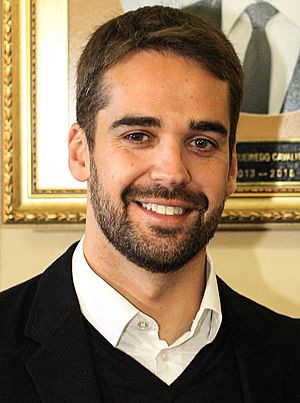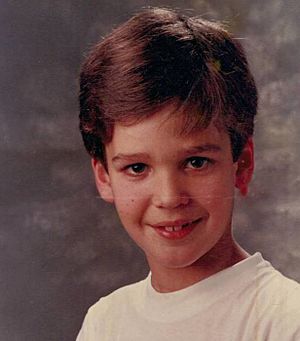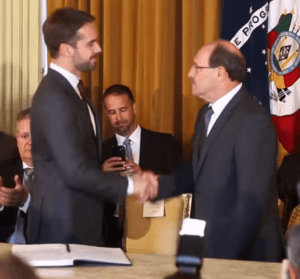Eduardo Leite facts for kids
Quick facts for kids
Eduardo Leite
|
|
|---|---|

Leite in July 2017
|
|
| Governor of Rio Grande do Sul | |
| Assumed office 1 January 2023 |
|
| Vice Governor | Gabriel Souza |
| Preceded by | Ranolfo Vieira Júnior |
| In office 1 January 2019 – 31 March 2022 |
|
| Vice Governor | Ranolfo Vieira Júnior |
| Preceded by | José Ivo Sartori |
| Succeeded by | Ranolfo Vieira Júnior |
| National President of the Brazilian Social Democracy Party | |
| In office 26 January 2023 – 30 November 2023 |
|
| Preceded by | Bruno Araújo |
| Succeeded by | Marconi Perillo |
| Mayor of Pelotas | |
| In office 1 January 2013 – 31 December 2016 |
|
| Vice Mayor | Paula Mascarenhas |
| Preceded by | Adolfo Antônio Fetter Júnior |
| Succeeded by | Paula Mascarenhas |
| President of the Municipal Chamber of Pelotas | |
| In office 1 January 2011 – 31 December 2012 |
|
| Preceded by | Milton Rodrigues Martins |
| Succeeded by | Luiz Eduardo Nogueira |
| Councillor of Pelotas | |
| In office 1 January 2009 – 31 December 2012 |
|
| Constituency | At-large |
| Personal details | |
| Born |
Eduardo Figueiredo Cavalheiro Leite
10 March 1985 Pelotas, Rio Grande do Sul, Brazil |
| Political party | PSDB (2001–present) |
| Domestic partner | Thalis Bolzan (2020–present) |
| Alma mater | Federal University of Pelotas (LL.B) |
Eduardo Figueiredo Cavalheiro Leite (born 10 March 1985) is a Brazilian politician. He is currently the governor of the state of Rio Grande do Sul. In 2018, he won the election for governor with 53.62% of the votes. At 33 years old, Leite became the youngest governor in Brazil.
He was elected governor of Rio Grande do Sul for a second time in 2022. He also served as the president of the Brazilian Social Democratic Party from January to November 2023.
Contents
Political Journey
Eduardo Leite started his political journey at a young age. He first ran for the city council in Pelotas in 2004 when he was 19. Even though he didn't win that time, he began working for local politicians from the Brazilian Social Democracy Party (PSDB).
In 2009, he was elected to the Pelotas city council. By 2011, Leite became the President of the Pelotas City Council. In 2013, he won the election to become the mayor of Pelotas and served from 2013 to 2016.
Mayor of Pelotas
As mayor, Leite made city management more modern. He focused on being careful with public money. This helped the city's finances become balanced. He also secured money for big building projects and improved the city's transportation. Health and education in Pelotas also got better during his time.
When his term ended, 87% of people approved of his work. Leite decided not to run for mayor again. Instead, he supported his vice-mayor, Paula Schild Mascarenhas, who then won the election.
In 2016, a North American magazine called “Americas Quarterly” named Eduardo Leite as one of the five most promising politicians under 40 in Latin America. After being mayor, Leite studied for a Master's degree in Public Management at Fundação Getulio Vargas.
Governor of Rio Grande do Sul
First Election as Governor (2018)
In 2017, Leite's party, the PSDB, stopped supporting the government of José Ivo Sartori. The next year, the PSDB chose Leite to run for governor. In the first round of elections, Leite received 35.9% of the votes. He then faced Sartori in a second round of voting, called a runoff election. Leite won this runoff election with almost 54% of the votes.
After winning, Leite needed to work with other political parties. This was because his group only had 18 out of 55 members in the State Legislature. He successfully got support from many parties that used to support Sartori. These included the Brazilian Socialist Party, Democrats, and the Liberal Party. Eventually, 32 out of 55 Assembly members supported Leite's government.
First Term as Governor
Leite became the governor of Rio Grande do Sul in 2019. In his first speech, he talked about the need for political agreement. He wanted to solve economic problems during a time when people had very different political views. He gave many positions in his government to members of the parties that supported him. Nine different parties were part of his team.
He also focused on selling some state-owned companies. These included companies for energy, mines, and natural gas. The state's constitution required a public vote to sell these companies. Leite introduced a change to the constitution to remove this rule. The Assembly approved this change in May 2019. In August 2019, the Assembly allowed the sale of these companies. The sales were finished in early 2021.
In late 2019, he announced a plan to save money. This plan included changes to how pensions work and to the state's public service. Leite said these changes were needed to fix the state's finances. After many talks with different parties and worker groups, the Assembly approved the plan in January 2020. This was seen as a very important and ambitious change for the state.
Second Election as Governor (2022)
On March 31, 2022, Leite stepped down as Governor of Rio Grande do Sul. He was considering running for president in the 2022 presidential election, but he had lost his party's primary election for that role.
He later announced he would seek to be re-elected as Governor of Rio Grande do Sul. In the first round, he received 26.81% of the votes. He came in second place, just ahead of Edegar Pretto from the Workers' Party. Leite then faced Onyx Lorenzoni in the second round and won.
Second Term as Governor
Leite was sworn in on January 1, 2023. He began his second term as governor of Rio Grande do Sul.
Political Ideas
Eduardo Leite is seen as a more left-leaning member of his party, the PSDB. In 2019, he described himself as a social democrat. In 2020, he called himself a social liberal. He believes that the government has a role in managing businesses and helping to reduce inequality. However, he also thinks that private businesses and social projects are important. Leite has also supported rules for gun control in cities.
See also
 In Spanish: Eduardo Leite para niños
In Spanish: Eduardo Leite para niños



